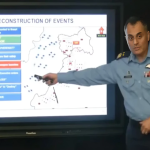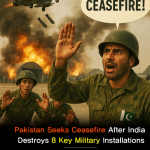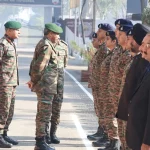In a major diplomatic breakthrough, US President Donald Trump announced that India and Pakistan have agreed to a “full and immediate ceasefire,” following a night of intense negotiations mediated by the United States. The agreement aims to halt the latest wave of hostilities between the two nuclear-armed rivals and stabilize the South Asian region after weeks of escalating violence.
The ceasefire, announced from the White House early Saturday, comes after both nations engaged in retaliatory military operations, including missile strikes and cross-border shelling, particularly around the disputed Kashmir region. Tensions peaked following India’s Operation Sindoor, a military campaign launched in early May to dismantle terror camps in Pakistan-administered territory, which was followed by Pakistani counterstrikes on over 25 Indian military installations.
President Trump, who personally led the diplomatic outreach, commended both Prime Minister Narendra Modi and Prime Minister Shehbaz Sharif for what he described as “common sense and great intelligence in the interest of global peace.” In his remarks, Trump underscored the United States’ role as a peace broker, calling the agreement a “testament to diplomacy over destruction.”
This marks a rare occasion where India has accepted third-party mediation, deviating from its longstanding policy of bilateral engagement with Pakistan on the Kashmir issue. Analysts attribute the shift to a combination of intense international pressure and the re-election of President Trump, whose administration had previously signaled interest in easing South Asian tensions.
The historical backdrop of India-Pakistan conflict continues to loom large. Since partition in 1947, the two countries have fought multiple wars and experienced repeated flare-ups over Kashmir. While ceasefires have been declared in the past—most notably in 2003—these have often broken down due to unresolved underlying issues, including terrorism, border incursions, and political mistrust.
Just days prior to the announcement, India had maintained that any de-escalation would require the dismantling of terror infrastructure operating from Pakistani soil. Whether this demand was addressed in the final ceasefire framework remains unclear, though observers suggest it may surface in follow-up diplomatic engagements.
Global reactions to the ceasefire have been cautiously optimistic. The United Nations, European Union, and several regional powers have welcomed the move while calling for sustained efforts to resolve core disputes and ensure humanitarian protections for civilians affected by the recent violence.
Experts warn that the ceasefire, while significant, is only a first step. “This is not a resolution—it’s a pause,” said South Asia analyst Dr. Neha Kapoor. “Unless the underlying grievances are addressed through dialogue and structural change, the risk of relapse into conflict remains high.”
As South Asia holds its breath, the success of this ceasefire will depend not only on continued diplomatic engagement but also on the political will in New Delhi and Islamabad to pursue lasting peace over military brinkmanship.













